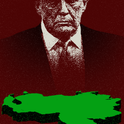Angela Merkel and Emmanuel Macron may not agree on the future of the EU, but they are of one mind in understanding its origins. Both believe it was founded as part of a precious liberal, rules-based international order—that Europe must now rally to defend. In a joint press conference with Canada’s Liberal premier Justin Trudeau last year, Macron declared that “the rules-based international order is being challenged not by the usual suspects, but by its main architect and guarantor: the US.” He vowed to fight its unchecked “hegemony,” which would spell “the end of the rule of law.” This argument, that we are witnessing the death of the rules-based order, is made with increasing frequency by troubled liberals. Given the bumpy path of politics and the vulgar posturing of Donald Trump, many Prospect readers will share Macron’s panicked reading.
The reality, however, which was always plain to Europeans who actually lived through the post-war years, is that there never was a liberal, rules-based order free from rampant hegemonic power. To grieve the loss of one is to mourn a phantom.
Ironically, nothing makes the unbridled US dominance of the post-1945 international order starker than its relationship with European allies. During the Cold War the US offered military guarantees to western European states in exchange for subordination. When during the Suez crisis, Britain and France tried to act independently against Egypt, the US used economic pressure to end their military action. Indeed, it was precisely because de Gaulle judged the US a hegemon that he pulled France out of Nato’s integrated military command in 1966, insisting France should “regain on her whole territory the full exercise of her sovereignty.”
The truth, however much we tell ourselves otherwise, is that coercive power in international politics has always been inescapable. Economically, western European states during the post-war years had to accommodate the realities of US power. The 1944 Bretton Woods conference agreed a set of rules for the IMF, the centrepiece of the new and supposedly international order, but it was tasked with overseeing a dollar-based exchange rate system that allowed the US a veto on states devaluing their currencies. In sharp contrast, when the US itself needed devaluation in 1971, Nixon simply ripped up the IMF’s rules without consulting any European state.
The US was never above making direct threats. When European companies became involved in the trans-Siberian pipeline to carry Soviet gas in the 1980s, Reagan resorted to “secondary sanctions” that punished western European companies. Britain’s then Trade Secretary, Arthur Cockfield, lamented “an unacceptable extension of American extra-territorial jurisdiction in a way which is repugnant in international law.”
After the Cold War ended American presidents were—briefly—keener to promulgate international rules. Clinton thought that China could be incorporated into the economic order through the World Trade Organisation. But that disguises the reality that protectionism within the US has obstructed it from completing any multilateral trade negotiations since the mid-1990s.
Trump is different from his predecessors not because he rejects multilateralism or deploys sanctions, but because he feels no need to disguise the fact that US dominance rests on coercive power. When he pulled out of the Paris climate accord, he was merely acting as the US Senate had when it refused to ratify the Kyoto Protocol, even before Clinton had signed it. When he imposed steel and aluminium tariffs on the EU, Canada and Mexico, he repeated George W Bush’s actions in 2002 in erecting tariffs on steel imports, including from Europe.
Trump’s bluntness is in part his personality. But it also reflects a changing geopolitical world where the incentives to disguise American coerciveness might have diminished. The US has both more and less power than it did. American shale gas production means the US can now confront European states that are dependent on Russian energy. Big foreign firms are increasingly reliant on the US banking system to make dollar payments, and this has widened the scope for extra-territorial sanctions, which has made it near impossible for European companies to continue doing business in Iran’s energy sector.
At the same time, the US is confronting a geopolitical disaster in the Middle East where Russia has re-emerged as a regional power and effectively broken Turkey’s membership of Nato. The illusion that China’s economic development could be constrained by the WTO has been shattered, and Washington is haunted by the prospect of a China-Russia axis. No international rules were ever going to allow the EU, or any European state, more of a say in how the US, with the power at its disposal, deals with the dilemmas created by all of that.
The question is not how to recreate an illusory international order. It is how to proceed now that the long pretence of equal partnership with the US is finally over. Trump’s willingness to expose political reality has created the conditions under which Europe can return to geopolitical responsibility.












